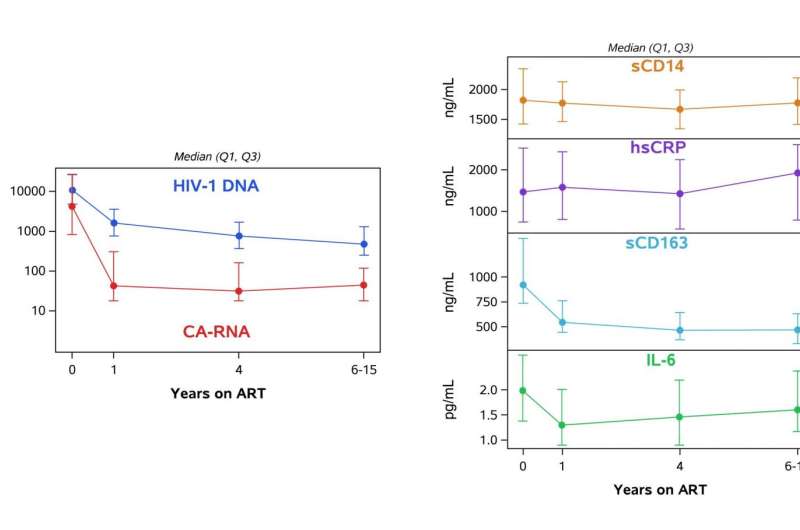Pretreatment HIV, immune activation levels determine their persistence during treatment

A study led by a Massachusetts General Hospital (MGH) investigator may have answered a major debate in HIV research - whether the tiny amounts of HIV that persist in patients receiving long-term antiretroviral treatment (ART) cause or are caused by the elevated levels of inflammation and immune system activation that also persist during ART. In a report published in the open-access journal PLOS Pathogens, a research team from the NIH-funded AIDS Clinical Trials Group (ACTG) describes finding that pretreatment viral levels and immune activation appear to determine the extent of HIV persistence and inflammation during ART. They also found that the low levels of HIV in the blood - below what can be detected using commercial tests - did not seem to influence persistent inflammation in people on treatment.
"Our findings suggest that damage to the immune system that occurs before people are started on treatment leads to continued immune activation, even though the medicines are keeping the virus in check," says Rajesh Gandhi, MD, of the MGH Division of Infectious Diseases, lead and corresponding author of the report. "This suggests that diagnosing HIV and starting antiretroviral therapy as soon as possible may prevent the elevated immune activation that can lead to health problems, such as heart disease. The results also suggest that new strategies focused on reducing immune activation may need to be added to novel interventions designed to reduce and eventually eliminate HIV."
Previous studies looking for possible relationships between viral levels - detected by sensitive research measures of HIV genetic material - and measures of immune activation while on ART had conflicting results, probably because they examined a single point in time without reference to patients' pretherapy status. The current investigation examined plasma and blood cell samples taken over time from 101 participants in ACTG studies - samples taken before ART, 1 and 4 years into treatment, and another taken between years 6 and 15. All participants reached and maintained viral levels undetectable by standard commercial measures by 1 year into treatment and maintained viral suppression for an average of 7 years, some for more than a decade.

Measures of HIV genetic material revealed the greatest drop in viral levels occurred during the first four years on ART but also revealed a continuing but slower decline during subsequent years. While HIV levels were correlated with markers of immune system activation in pretreatment samples, the association between viral levels and inflammatory markers disappeared once ART was initiated. Instead it was the pretreatment levels of both factors that appeared to determine levels of viral persistence and immune activation while on ART.
Senior author John Mellors, MD, chief of the Division of Infectious Diseases and a professor of Medicine at University of Pittsburgh School of Medicine, says, "It appears that different mechanisms are driving the stubborn persistence of HIV reservoirs and the harmful, chronic immune activation that are characteristic of HIV infection despite current treatments. This important finding is a first step towards identifying specific therapies for each problem."
Adds Gandhi, who is an associate professor of Medicine at Harvard Medical School, "Now we need to investigate viral and human genetic factors that affect HIV persistence and immune activation in people on ART and develop strategies to reduce HIV levels and inflammation that go beyond our current antiretroviral medications. Since most HIV lives in tissues, such as lymph nodes, and not in the blood, we need to look into HIV persistence and immune activation in tissues as well."
More information: PLOS Pathogens (2017). journals.plos.org/plospathogen … journal.ppat.1006285

















